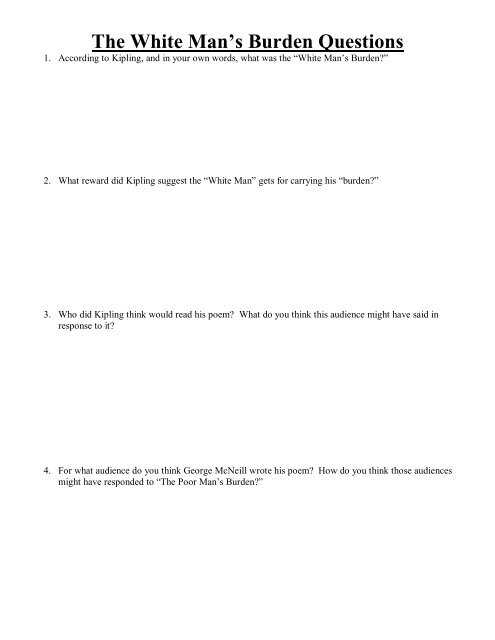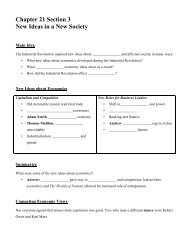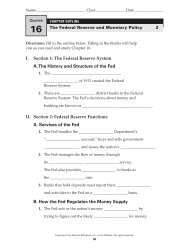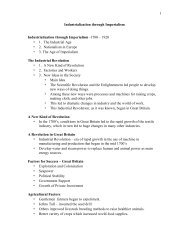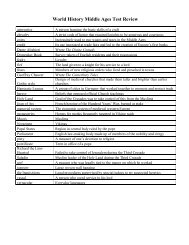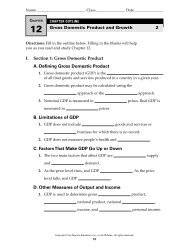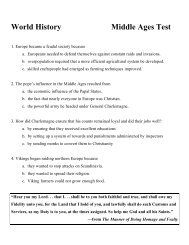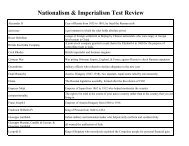The White Man's Burden Questions
The White Man's Burden Questions
The White Man's Burden Questions
You also want an ePaper? Increase the reach of your titles
YUMPU automatically turns print PDFs into web optimized ePapers that Google loves.
<strong>The</strong> <strong>White</strong> Man’s <strong>Burden</strong> <strong>Questions</strong><br />
1. According to Kipling, and in your own words, what was the “<strong>White</strong> Man’s <strong>Burden</strong>?”<br />
2. What reward did Kipling suggest the “<strong>White</strong> Man” gets for carrying his “burden?”<br />
3. Who did Kipling think would read his poem? What do you think this audience might have said in<br />
response to it?<br />
4. For what audience do you think George McNeill wrote his poem? How do you think those audiences<br />
might have responded to “<strong>The</strong> Poor Man’s <strong>Burden</strong>?”
5. For what audience do you think H.T. Johnson wrote his poem? How do you think those audiences<br />
might have responded to “<strong>The</strong> Black Man’s <strong>Burden</strong>?”<br />
2<br />
6. What are the tone and message of “<strong>The</strong> Real <strong>White</strong> Man’s <strong>Burden</strong>?” For what audience was this poem<br />
written and how might they have responded?
“<strong>The</strong> <strong>White</strong> Man’s <strong>Burden</strong>”: Kipling’s Hymn to U.S. Imperialism<br />
In February 1899, British novelist and poet Rudyard Kipling wrote a poem entitled “<strong>The</strong> <strong>White</strong> Man’s <strong>Burden</strong>: <strong>The</strong> United<br />
States and <strong>The</strong> Philippine Islands.” In this poem, Kipling urged the U.S. to take up the “burden” of empire, as had Britain and other<br />
European nations. Published in the February, 1899 issue of McClure’s Magazine, the poem coincided with the beginning of the<br />
Philippine-American War and U.S. Senate ratification of the treaty that placed Puerto Rico, Guam, Cuba, and the Philippines under<br />
American control. <strong>The</strong>odore Roosevelt, soon to become vice-president and then president, copied the poem and sent it to his friend,<br />
Senator Henry Cabot Lodge, commenting that it was “rather poor poetry, but good sense from the expansion point of view.” Not<br />
everyone was as favorably impressed as Roosevelt. <strong>The</strong> racialized notion of the “<strong>White</strong> Man’s burden” became a euphemism for<br />
imperialism, and many anti-imperialists couched their opposition in reaction to the phrase.<br />
Take up the <strong>White</strong> Man’s burden—<br />
Send forth the best ye breed—<br />
Go send your sons to exile<br />
To serve your captives' need<br />
To wait in heavy harness<br />
On fluttered folk and wild—<br />
Your new-caught, sullen peoples,<br />
Half devil and half child<br />
Take up the <strong>White</strong> Man’s burden<br />
In patience to abide<br />
To veil the threat of terror<br />
And check the show of pride;<br />
By open speech and simple<br />
An hundred times made plain<br />
To seek another’s profit<br />
And work another’s gain<br />
Take up the <strong>White</strong> Man’s burden—<br />
And reap his old reward:<br />
<strong>The</strong> blame of those ye better<br />
<strong>The</strong> hate of those ye guard—<br />
<strong>The</strong> cry of hosts ye humour<br />
(Ah slowly) to the light:<br />
"Why brought ye us from bondage,<br />
“Our loved Egyptian night?”<br />
Take up the <strong>White</strong> Man’s burden-<br />
Have done with childish days-<br />
<strong>The</strong> lightly proffered laurel,<br />
<strong>The</strong> easy, ungrudged praise.<br />
Comes now, to search your manhood<br />
Through all the thankless years,<br />
Cold-edged with dear-bought wisdom,<br />
<strong>The</strong> judgment of your peers!<br />
Source: Rudyard Kipling, “<strong>The</strong> <strong>White</strong> Man’s <strong>Burden</strong>: <strong>The</strong> United States & <strong>The</strong> Philippine Islands, 1899.” Rudyard Kipling’s Verse:<br />
Definitive Edition (Garden City, New York: Doubleday, 1929).<br />
3
“<strong>The</strong> Poor Man’s <strong>Burden</strong>”: Labor Lampoons Kipling<br />
In one of many parodies of “<strong>The</strong> <strong>White</strong> Man’s <strong>Burden</strong>” from the time, labor editor George McNeill penned the satirical “Poor Man’s<br />
<strong>Burden</strong>,” published in March, 1899. Source: George McNeill, “<strong>The</strong> Poor Man’s <strong>Burden</strong>,” American Federationist (March 1899).<br />
Pile on the Poor Man’s <strong>Burden</strong>—<br />
Drive out the beastly breed;<br />
Go bind his sons in exile<br />
To serve your pride and greed;<br />
To wait in heavy harness,<br />
Upon your rich and grand;<br />
<strong>The</strong> common working peoples,<br />
<strong>The</strong> serfs of every land.<br />
Pile on the Poor Man’s <strong>Burden</strong>—<br />
His patience will abide;<br />
He’ll veil the threat of terror<br />
And check the show of pride.<br />
By pious cant and humbug<br />
You’ll show his pathway plain,<br />
To work for another’s profit<br />
And suffer on in pain.<br />
Pile on the Poor Man’s <strong>Burden</strong>—<br />
Your savage wars increase,<br />
Give him his full of Famine,<br />
Nor bid his sickness cease.<br />
And when your goal is nearest<br />
Your glory’s dearly bought,<br />
For the Poor Man in his fury,<br />
May bring your pride to naught.<br />
Pile on the Poor Man’s <strong>Burden</strong>—<br />
Your Monopolistic rings<br />
Shall crush the serf and sweeper<br />
Like iron rule of kings.<br />
Your joys he shall not enter,<br />
Nor pleasant roads shall tread;<br />
He’ll make them with his living,<br />
And mar them with his dead.<br />
Pile on the Poor Man’s <strong>Burden</strong>—<br />
<strong>The</strong> day of reckoning’s near—<br />
He will call aloud on Freedom,<br />
And Freedom’s God shall hear.<br />
He will try you in the balance;<br />
He will deal out justice true:<br />
For the Poor Man with his burden<br />
Weighs more with God than you.<br />
Lift off the Poor Man’s <strong>Burden</strong>—<br />
My Country, grand and great—<br />
<strong>The</strong> Orient has no treasures<br />
To buy a Christian state,<br />
Our souls brook not oppression;<br />
Our needs—if read aright—<br />
Call not for wide possession.<br />
But Freedom’s sacred light.<br />
4
“<strong>The</strong> Black Man’s <strong>Burden</strong>”: A Response to Kipling<br />
Among the dozens of replies to Kipling’s poem was “<strong>The</strong> Black Man’s <strong>Burden</strong>,” written by African-American clergyman and editor<br />
H. T. Johnson and published in April 1899. A “Black Man’s <strong>Burden</strong> Association” was even organized with the goal of demonstrating<br />
that mistreatment of brown people in the Philippines was an extension of the mistreatment of black Americans at home.<br />
Pile on the Black Man’s <strong>Burden</strong>.<br />
'Tis nearest at your door;<br />
Why heed long bleeding Cuba,<br />
or dark Hawaii’s shore?<br />
Hail ye your fearless armies,<br />
Which menace feeble folks<br />
Who fight with clubs and arrows<br />
and brook your rifle’s smoke.<br />
Pile on the Black Man’s <strong>Burden</strong><br />
His wail with laughter drown<br />
You’ve sealed the Red Man’s problem,<br />
And will take up the Brown,<br />
In vain ye seek to end it,<br />
With bullets, blood or death<br />
Better by far defend it<br />
With honor’s holy breath.<br />
Source: H.T. Johnson, “<strong>The</strong> Black Man’s <strong>Burden</strong>,” Voice of Missions, VII (Atlanta: April 1899), 1. Reprinted in Willard B. Gatewood,<br />
Jr., Black Americans and the <strong>White</strong> Man’s <strong>Burden</strong>, 1898–1903 (Urbana: University of Illinois Press), 1975, 183–184.<br />
5
<strong>The</strong> Real "<strong>White</strong> <strong>Man's</strong> <strong>Burden</strong>"<br />
By Ernest Crosby~New York Times (Feb. 15, 1899)<br />
6<br />
Take up the <strong>White</strong> <strong>Man's</strong> burden;<br />
Send forth your sturdy sons,<br />
And load them down with whisky<br />
And Testaments and guns.<br />
Throw in a few diseases<br />
To spread in tropic climes,<br />
For there the healthy *******<br />
Are quite behind the times.<br />
And don't forget the factories.<br />
On those benighted shores<br />
<strong>The</strong>y have no cheerful iron-mills<br />
Nor eke department stores.<br />
<strong>The</strong>y never work twelve hours a day,<br />
And live in strange content,<br />
Altho they never have to pay<br />
A single cent of rent.<br />
Take up the <strong>White</strong> <strong>Man's</strong> burden,<br />
And teach the Philippines<br />
What interest and taxes are<br />
And what a mortgage means.<br />
Give them electrocution chairs,<br />
And prisons, too, galore,<br />
And if they seem inclined to kick,<br />
<strong>The</strong>n spill their heathen gore.<br />
<strong>The</strong>y need our labor question, too,<br />
And politics and fraud,<br />
We've made a pretty mess at home;<br />
Let's make a mess abroad.<br />
And let us ever humbly pray<br />
<strong>The</strong> Lord of Hosts may deign<br />
To stir our feeble memories,<br />
Lest we forget -- the Maine.<br />
Take up the <strong>White</strong> <strong>Man's</strong> burden;<br />
To you who thus succeed<br />
In civilizing savage hoards<br />
<strong>The</strong>y owe a debt, indeed;<br />
Concessions, pensions, salaries,<br />
And privilege and right,<br />
With outstretched hands you raise to bless<br />
Grab everything in sight.<br />
Take up the <strong>White</strong> <strong>Man's</strong> burden,<br />
And if you write in verse,<br />
Flatter your Nation's vices<br />
And strive to make them worse.<br />
<strong>The</strong>n learn that if with pious words<br />
You ornament each phrase,<br />
In a world of canting hypocrites<br />
This kind of business pays


